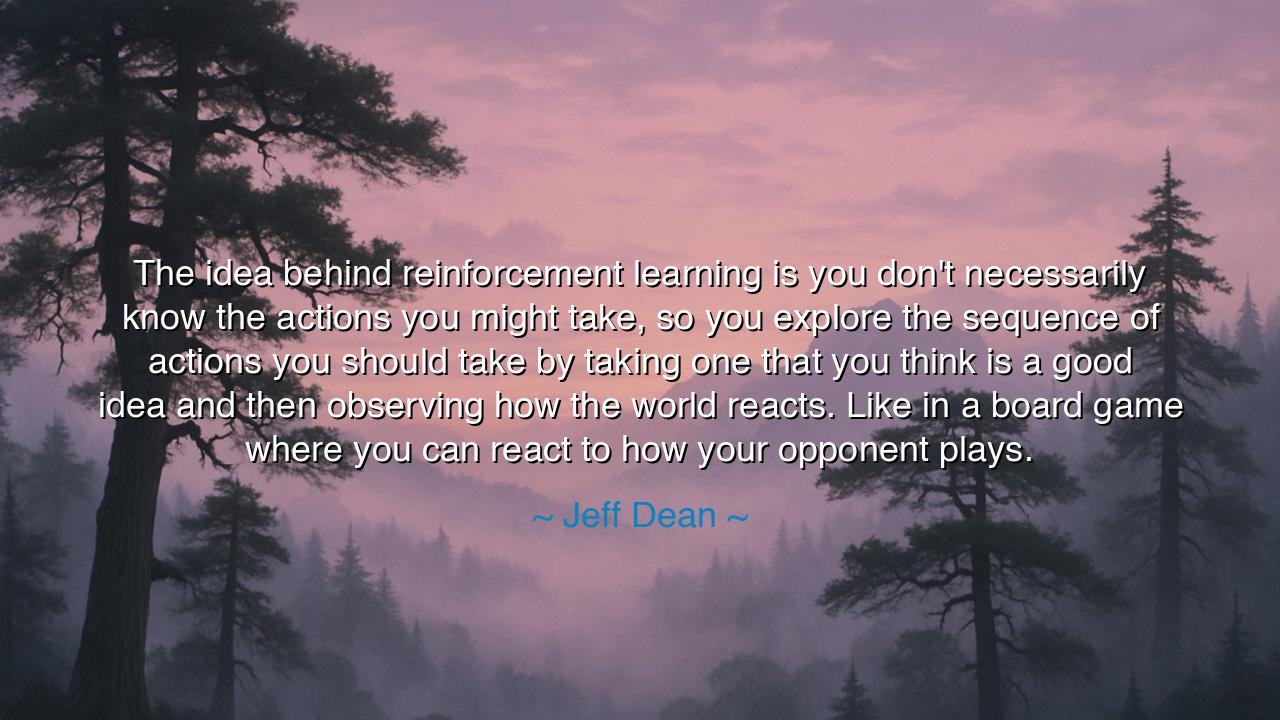
The idea behind reinforcement learning is you don't necessarily
The idea behind reinforcement learning is you don't necessarily know the actions you might take, so you explore the sequence of actions you should take by taking one that you think is a good idea and then observing how the world reacts. Like in a board game where you can react to how your opponent plays.






In the counsel of the elders we hear a new parable for our age: “The idea behind reinforcement learning” is that a traveler sets forth without a perfect map. The paths of actions are not yet known; they are discovered by walking. One chooses a step that seems wise, and then listens—deeply—to how the world reacts. Thus the way is carved by trial and error, as a river learns the bend of the earth not from prophecy but from flowing. In this saying, Jeff Dean gathers the logic of machines and the intuition of wanderers into one teaching.
The ancients would nod: wisdom is forged where experience strikes choice like flint on steel. In reinforcement learning, a seeker observes the state of things, takes an action, receives a reward or a rebuke, and adjusts the policy—the inner rule for choosing—so the next step is wiser. This is not the brittle certainty of a script; it is the flexible courage of a sailor trimming his sail to the shifting wind. The lesson is humble and heroic at once: do not demand that the world be simple; become skillful at reading its reply.
Consider the image of the board game that Dean invokes. Across the table sits an opponent, not as an enemy but as a mirror held by fate. You move a stone; the board replies; your sequence of actions takes shape under pressure. In play, as in life, the plan survives only if it can be revised. Strategy, then, is not a monument but a dance: sense the feedback, revise the policy, seek the next best move, again and again, until the pattern of victory reveals itself.
We have seen this parable written in our own century upon the grid of 19 lines by 19 lines. When AlphaGo faced Lee Sedol, the program did not triumph through a fixed script but through countless rehearsals of exploration and reward, shaping a sense of value for positions no master had fully charted. Move 37—quiet as snowfall, shocking as thunder—was not an oracle’s decree; it was the fruit of a policy trained to trust unlikely actions when the hidden returns were rich. And when Lee answered with his own brilliant hand in Game 4, it was the human echo of the same law: attend to the world’s reply, adapt your line, discover the move that was invisible before. Thus machine and grandmaster together testified to the old-new wisdom Dean describes.
Yet this teaching is older than silicon. The craftsman who perfects a blade, reheating and quenching until it sings; the physician who tests a remedy, measuring rewards in steady pulses; the general who scouts the ground and feints to learn where the enemy leans—each practices reinforcement learning in flesh and time. They do not cling to first guesses. They cultivate a rhythm: act, observe, update. This is the drumbeat beneath every durable triumph.
What, then, is the heart of the saying? It is the courage to explore before we exploit, to seek knowledge not only by thinking but by doing, to let feedback correct pride, and to let small rewards accumulate into great gains. The world is not a scroll to be read once; it is an opponent who plays back. If we harden into certainty, we grow brittle; if we listen, we grow strong. The wise sharpen their policy the way a gardener prunes a tree—cutting what withers so that what lives may bear fruit.
Take this lesson to your own road. First, define your state: name where you are without flattery. Second, choose a modest action you judge promising. Third, observe the world’s reaction with honesty. Fourth, update your policy—change your rule for choosing—and repeat. In practice: (1) set one measurable goal per week, (2) try one new move that could raise your reward (a sales script, a study tactic, a training routine), (3) record results the same day, and (4) keep only what improves the score by your own true metric. In this way you will convert chance into learning, learning into mastery, and mastery into service. For the path is walked as it is found, and the game is won one answer to the world at a time.






AAdministratorAdministrator
Welcome, honored guests. Please leave a comment, we will respond soon